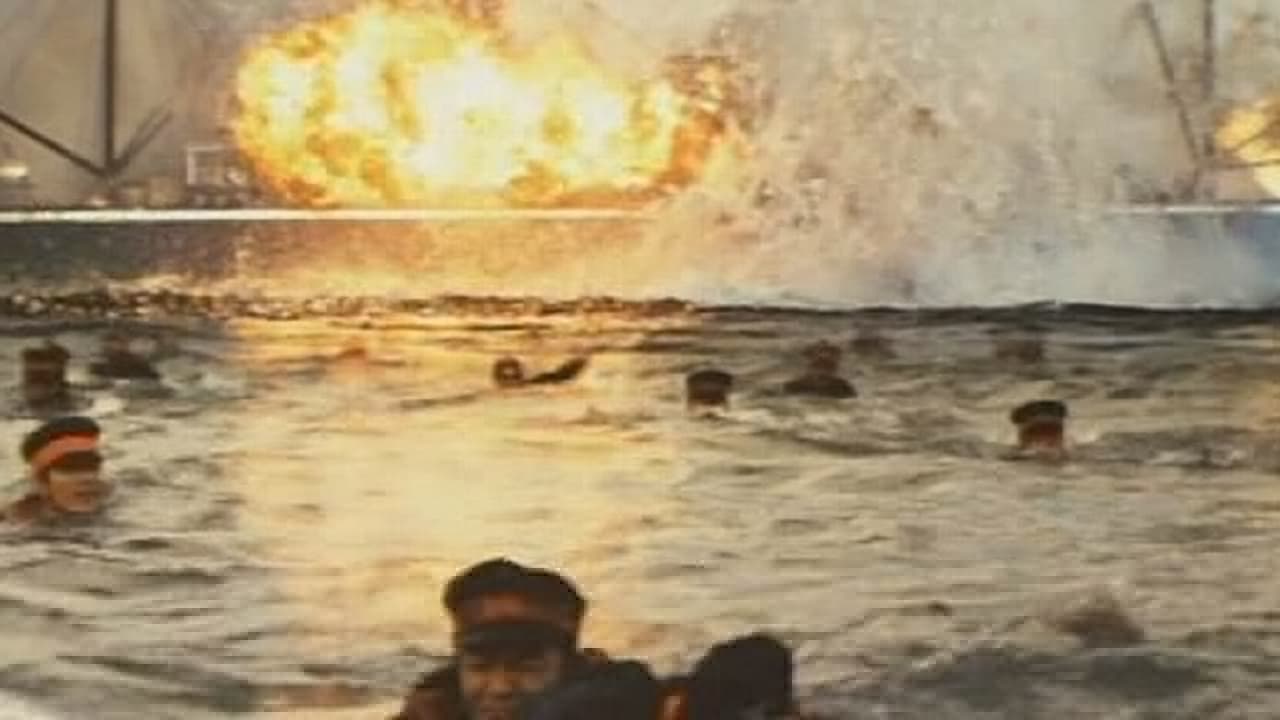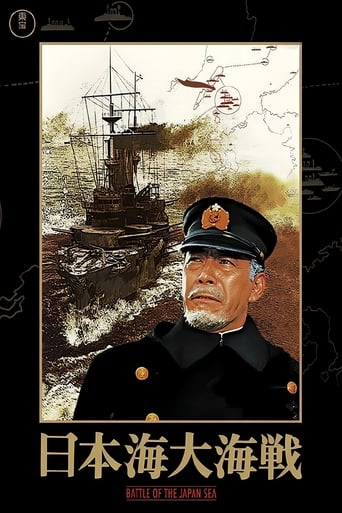



Absolutely brilliant
if their story seems completely bonkers, almost like a feverish work of fiction, you ain't heard nothing yet.
View MoreThe plot isn't so bad, but the pace of storytelling is too slow which makes people bored. Certain moments are so obvious and unnecessary for the main plot. I would've fast-forwarded those moments if it was an online streaming. The ending looks like implying a sequel, not sure if this movie will get one
View MoreAmazing worth wacthing. So good. Biased but well made with many good points.
View MoreBATTLE OF THE SEA OF JAPAN (Nihonkai daikaisen) 1969This 1969 Japanese film is about the war of 1904-05 between the Russian and Japanese Empires. It shows how the war came about, and the political infighting that led to the conflict. The war was over what Japan thought was Russian meddling in the area around Japan. The Japanese sent ground troops to attack the Russian fort at Port Arthur. There were also several large naval battles. The war ended with the Japanese victorious. The Russian loss was the largest defeat of a European country by a non-European nation, since the Italian's were roundly thumped at the Battle of Adowa on March 1, 1896 by the Ethiopians.The film shows all these various events from the start of the conflict, to the large naval battle that more or less ended the fight. Toshiro Mifune plays the lead here as Admiral Togo. The Russians for the most part were played by U.S. servicemen stationed in Japan.The action scenes are quite well handled with plenty of blood being spilt. Being a Toho Studio Production, there is plenty of superb model work on display. The pre cgi effects are quite something to see. The naval battles are excellent, and the ship models look quite accurate.This was the first war where modern weapons were put to work with deadly effect. The tactics of 20 years earlier against machine guns etc caused large casualties on both side. The navies of the time still thought the ram was a viable weapon. State of the art naval guns wrought havoc on this dated idea. The Russian fleet lost so many ships in the conflict, that, they went from the third largest fleet in the world, to eighth. By the time World War One rolled around they still had not replaced their losses.Well worth a look if you are a military history buff.
View MoreFirst, I like this movie. The battle scenes are generally well done and the model work is very impressive. It is not entirely true to the actual events but how many war movies are? The acting is not great, except for Mifune, but it's not unwatchable either. And, as another reviewer mentioned, it is the only movie I know of that covers the Russo-Japanese War.As one of the reviewers here commented, the movie subtitles are notably bad, so much so that there is a statement at the end of the movie apologizing for the misspelled Russian names and incorrect ranks. But it wasn't just the Russian ranks that were wrong, they were incorrect for most of the Japanese characters, too, and the whole translation was not good English. The subtitles were bad enough that they distracted me from the story. In some movies, bad subtitles can be enjoyed as humor, but this is not the kind of movie where that should happen. It bothered me enough that I decided to see if I could do something about it. I don't speak Japanese so I took the existing translation and fixed the obvious problems of spelling, grammar and syntax. Poor use of idiom could usually be determined from context. And there were lots of errors or inconsistencies in translation of military ranks and Russian ship and personnel names. Some of it is differences in culture, however. For example, the "san" suffix on Japanese names is normally translated as "Mr." but that isn't really how western culture handles it. The Japanese are more formal than we so in most instances we would just leave off the "Mr." and call someone by their name. But in the case where the person has a title or rank, we would use that. For example, instead of "Mr. Ito" or "Mr. Togo" we would say "Prince Ito" or "Admiral Togo." The other thing was place names. The original subtitles used Japanese place names which are mostly meaningless to us, for example "Ryojun" instead of "Port Arthur." And then there were just the mistakes of words that look similar but mean very different things. There is a line that was translated as "I am doing my dumbest to insure victory" when, of course, it should be "I am doing my damnedest to insure victory." Finally, I took some liberty and made the narration of some of the battles more accurately reflect the actual historical events. For example, the movie has Togo "crossing the T" in the Battle of the Yellow Sea when actually he used that tactic (twice) in the Battle of Tsushima. For anyone interested, I have posted the revised subtitles to several of the more useful subtitle sites on the web.UPDATE: It seems there are at least two other movies about the Russo-Japanese War. Not surprisingly, both are also Japanese made.
View MoreMuch like THE LAST VALLEY is the only real (known to me anyway) film to deal with the '30 Years War', this film is the only one (that I know of) to cover the 'Russo-Japanese War'. It's interesting as this piece of history isn't really covered much. At the turn of the century there was a lot of feuding between the European powers, especially over their empires in China, the Middle East, and Africa. It was the era when new weapons were constantly being introduced and when newly industrialized nations (like Japan) were building their military machines and new ships to rule the seas. This unique era provided armies the opportunity to slaughter each other with modern weapons like artillery and magazine-loading guns, without the benefit of tanks or airplanes (which to me makes war a lot less interesting and with one side or the other with an unfair overwhelming advantage).This movie excellently brings such combat to life, and (unlike LAST VALLEY which was a small slice of life) covers the full breadth of the conflict... culminating in the huge and decisive battle in the Tsushima Straights between the fledgling Japanese force and the mighty 40-ship Russian Baltic Fleet which had sailed around the world for 6 months to fight them.This film was the final penultimate film for Japanese special effects director Eiji Tsuburaya, who provides some of his best, most detailed, and most convincing miniature work ever. There's a healthy number of composite shots to blend the miniatures with the live action, and the effects are overall quite amazing (though not completely convincing). The acting (especially with American expatriates as Russians) leaves some to be desired, but one has to give the Japanese credit for improvising since Russia angrily refused to cooperate with this production at all.The land battles during the siege of Port Arthur are quite large and exciting, even genuinely moving in a few places as you can really feel General Nogi's frustration with the extremely high casualties and lack of progress. Mifune brings a great gravitas to his role as Togo, dubbed "Japan's Nelson" at the time, and several of the better character actors from the early Godzilla movies pop up as random officers. The ending features a similar speech to Christopher Plummer's in the following year's WATERLOO, which gives all the fun, excitement, and jingoism a more somber spin.I must also mention the excellent cinematography, staging, and music which give the film a very polished look of a monumental, groundbreaking epic. More so than most other war films of the time. Sure this film takes a few Historical liberties (mostly to simplify the more complex battles) but it still provides a lot of eye-opening insight on a largely forgotten, but significant war (in that it set the stage for the Russian Revolution AND the second Sino-Japanese war).All in all, I was not disappointed. For a Japanese war movie, it's the best I've seen, right up there with the sadly rare STORM OVER THE PACIFIC.
View Morei was a young us forces member, working part time in the movies during 1967-70 in japan. in this movie, i was an aid-de-camp to the russian admiral (rodyshvinski). as i was an american, not speaking russian, they brought a professor from waseda univ to teach me phonetic russian, not having any idea what i was saying. 30+ years later, here i am in kiev for 10 years and want to find a copy of this movie to see what i said as i died dramatically, having been shot putting up the flag as our ship was sinking... it was said to be a significant movie from the japanese standpoint at the time, but i'm finding the russians i work with have a totally different perspective ;-) i'd also like cast member credits. i see our agent, mr yusef a. is listed.
View More